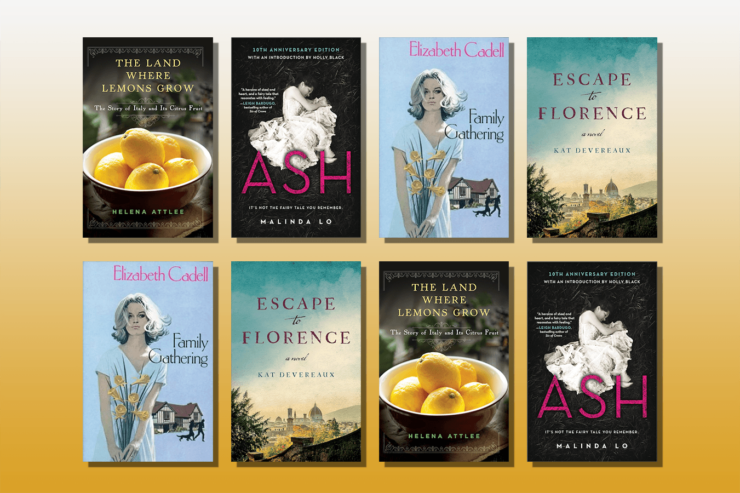April was a very busy month, I was in Chicago the whole time helping Ada Palmer run the Papal Election of 1492. We elected a terrible pope, had a terrible war, imposed another terrible pope, and generally had a great time. However, I had barely any time to read anything except papal election letters; I also wrote a lot of papal election letters (and, as patrons of my Patreon already know, papal election poetry) and read only four books—this is normal when the only time I read is when I read myself to sleep.
Escape to Florence — Kat Devereaux (2023)
Romance novel set in Italy, with a contemporary romance and another story set during the Italian period of resistance to fascism at the end of WWII. It’s hard to keep these things in balance and make the pacing work right, and the book doesn’t, really: the WWII material is so much darker that none of the modern-day problems seem like problems—and indeed they dissolve very easily. Having said that, the historical story might have been too dark to take without the modern story buoying it up. The details of Florence and of Italian bureaucracy were very well done. I enjoyed this and thought about it and the balance and connection of the two stories more than I usually would with a book like this. It’s a first novel, and I’ll keep an eye on the author.
The Land Where Lemons Grow — Helena Attlee (2014)
A non-fiction book about citrus in Italy, looking at the historical and present-day cultivation of lemons, oranges, bergamot, and citrons in different parts of Italy. This was weirdly interesting and full of information and anecdotes. It’s a combination history and food and travel memoir, and there are occasional recipes. It’s well written and surprisingly varied. I had no idea bergamot was cultivated for anything but Earl Grey tea, but it turns out to be a major constituent of a lot of perfumes. I also knew nothing about the fussy requirements of cultivation of citrons for Sukkot. If you’re interested in citrus fruit you probably know all this already, but if you’re wanting to learn about a new thing that’s kind of cool and intersects with a lot of other things, this is an engaging read.
Family Gathering — Elizabeth Cadell (1979)
Cadell wrote light fiction, some of it genre romance and some of it not, and she was very good at atmosphere and characters (especially children) and very bad at romance. (Indeed, I had to make up a race of aliens to fix Bridal Array because humans just don’t work in that plot.) Family Gathering is set immediately after WWII, in 1948 or 1949, and it’s about a kind of character you almost never see in fiction, and when you do you absolutely never see them treated sympathetically. Natalie Rome is a weak, spineless woman who finds it hard to make up her mind and impossible to argue with stronger-willed people, so she is pushed around. Her stepdaughter Lucille is the same way. Her daughter Helen has become a bully from the need to parent her mother since her father died. The universe of this novel requires that Helen learn to submit and not dominate, which is decidedly uncomfortable to read. However, it’s fascinating reading Natalie being treated as sympathetic and central. The book is very funny in some parts, and although some of the characters are caricatures, and although it is a series of set pieces rather than a real plot, it overall works better than it deserves. I would not call this a good book, and I would not exactly recommend it, but I’m not at all sorry I read it.
Ash — Malinda Lo (2009)
Dark YA lesbian retelling of Cinderella that is precisely written and observed. This is a weird book, actually. It has great worldbuilding that feels really solid, and then it does very little with the greenwitches and philosophers that it has established so well. The faery elements are terrific, the whole way the wood and the magic and the faeries are done is solid and excellent, but in the way it’s used it leans into the angsty dark boyfriend a little too much. Similarly, the threat and power of the stepmother is conveniently present or absent for plot reasons. And we just won’t think about the economics of the world. It’s very atmospheric, but after the other, better, later written, Lo I have read, this was a little disappointing. She was already a really good writer when she wrote this, and I’m glad she went with her strengths of writing family and character in real researchable worlds where the solid background details that real history provides can give support to the things she does so well.










